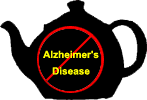 | Can Tea Keep Alzheimer's Disease Away? |
 January 8, 2005
January 8, 2005Drinking green and black tea may help people with Alzheimer's disease. In laboratory experiments, researchers have found that green and black tea act in a way similar to that of some drugs used to treat people with Alzheimer's disease. These drugs target an enzyme called acetylcholinesterase (AChE). AChE breaks down the neurotransmitter acetylcholine. By stopping the action of AChE, these drugs can increase the levels of acetylcholine in the brain and improve cognitive function (memory, attention) in people with Alzheimer's disease. New research shows that green and black tea also stop the action of AChE.
It is not known what specific compound in tea is responsible for inhibiting the action of AChE or beta-secretase. Moreover, the effectiveness of drinking tea is controversial because countries where people drink a lot of tea (e.g., China, Japan) do not have an especially low incidence of Alzheimer's disease.
|
Reference and further information:
|
| GO TO: | Neuroscience In The News | Explore the Nervous System | Table of Contents |
![[email]](./gif/menue.gif) Send E-mail |
 Fill out survey |
 Get Newsletter |
 Search Pages |
 Scientists made extracts of green tea, black tea and coffee. These
extracts were tested for their abilities to reduce the activity of AChE.
Green tea was the best blocker of AChE, followed by black tea and then
coffee. Green tea also reduced the activity of another enzyme called
beta-secretase. Beta-secretase has been linked to the development of
neuritic plaques that are commonly found in the brains of people with
Alzheimer's disease.
Scientists made extracts of green tea, black tea and coffee. These
extracts were tested for their abilities to reduce the activity of AChE.
Green tea was the best blocker of AChE, followed by black tea and then
coffee. Green tea also reduced the activity of another enzyme called
beta-secretase. Beta-secretase has been linked to the development of
neuritic plaques that are commonly found in the brains of people with
Alzheimer's disease. Hear
IT!
Hear
IT!